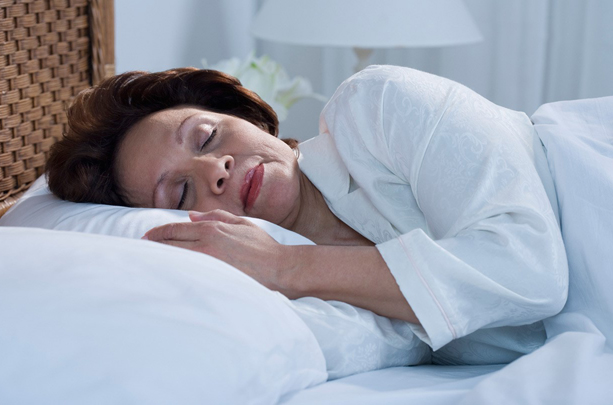9 Ways to Sleep Better with Osteoarthritis Pain

As if it’s not enough that your osteoarthritis bothers you throughout the day, pain and stiffness can also interrupt your ability to get a good night’s sleep.
This is bad news because poor sleep can cause pain to be worse—this creates a damaging cycle of pain and poor sleep.
If osteoarthritis pain and stiffness are keeping you from falling asleep or staying asleep, try following these 9 tips:
1 – Use heat therapy before bed
Ease a painful joint by using a heating pad for 15 to 20 minutes before bed. Or take a soothing bath for the same effect—just give yourself time to cool down afterward, because it’s hard to get to sleep if you’re overheated.
2 – Explore medication solutions
Insomnia and sleep problems may be the result of a medication you are taking to treat osteoarthritis pain or another condition. Talk with your doctor about switching medications or adjusting the timing of when you take them.
You may also be a good candidate for a prescription medication specifically to address insomnia. These medications can be very helpful but can be habit-forming and need to be taken with care.
3 – Take a nighttime pain reliever
There are several formulations of over-the-counter pain relievers specifically intended for use in at night to both relieve osteoarthritis pain and help you sleep better.
4 – Consider your mattress
A good mattress can make a big difference in your level of comfort and support as you sleep. For those with osteoarthritis, your mattress should be supportive but not too hard. If you can’t invest in a new mattress right now, consider adding a mattress topper.
5 – Use pillows strategically
Where and what type of pillows you use at night is important. If you have neck (cervical) arthritis, use a standard pillow that’s firm but not too high. For hip or knee arthritis, you may benefit from a wedge pillow next to you or a small pillow between your knees.
6 – Rule out sleep apnea
Those who are overweight or obese are at increased risk for both osteoarthritis and a sleep condition called sleep apnea, which causes patients to stop breathing and wake up abruptly several times a night. If you suspect you may have sleep apnea, talk with your doctor about undergoing a sleep study.
7 – Exercise and stretch
Your joints are meant to move—the more you keep them immobile, the stiffer and more painful they’ll become. Stay as active as you can and do stretches intended to maintain strength and range of motion in your osteoarthritis-affected joint.
8 – Practice good sleep hygiene
Follow habits that promote good sleep, such as:
- Going to bed at the same time every night
- Establishing a night routine to prepare your mind and body for sleep
- Banning phones, TVs, and other electronics from the bedroom
- Avoiding large meals and caffeine before bed
9 – Manage your osteoarthritis or other health conditions
The better your overall health, the less likely conditions like arthritis or others will disrupt your sleep.
Remember: osteoarthritis, chronic pain, and sleep problems are all treatable. If you’re struggling with poor sleep because of osteoarthritis pain, make an appointment to see us and explore your solutions.
Original article: Arthritis Health
If you’re suffering from osteoarthritis, come see us to find out about your options for treatment. Under our care, your treatment may include orthopedic joint injections, spinal adjustments, physical rehab, clinical massage, and stretching and strengthening exercises. We can also recommend natural, drug-free ways to control your pain and discomfort.



